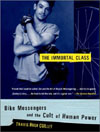
Comment
on this story
|
 |

Zen and the art of bicycle messengering
by Jeanne McDonald
It's the blur I remember, a blue and yellow blur that suddenly appeared from behind us and elongated as it passed inches from the car windows. It sped ahead of us, balancing on the yellow line, then cut across the curb and rolled through the red light at the next intersection. All this in the frantic, heavy traffic of downtown Washington, D.C.
"It's a bike messenger," said my sister Joanne, who was driving. "Drivers hate them because they cause so many accidents, but I've seen messengers go down, too." In fact, statistics show that in New York City alone, of the 15 or 20 cyclists who die each year in accidents at least two are messengers. Injuries, which are much more endemic, generally go unrecorded. In our automobile-dominated society, the cyclist is a maverick, an outlaw, the stepchild of outdated or cloudy legislation that protects four-wheeled vehicles above other forms of transportation. These young men, and occasionally, women, speed through the streets to deliver and pick up messages as fast as they can. The faster their messages are delivered, the more money they make, and, inevitably, the more danger they are subjected to.
Some messengers don't live to tell their stories; others are overwhelmed by the bureaucracy that strives to keep them in their place. But along comes Travis Hugh Culley, a director and playwright who moved to Chicago to make a name for himself in the theater scene and ended up as a messenger to make ends meet. Culley found the job terrifying, exhilarating, and in many ways, rewarding. But from day one, he realized that messengers are classified by both drivers and pedestrians as subhuman,  invisible, and dispensable. Luckily, Culley is also articulate, introspective, and passionate, and he survived to tell his story in a compelling book, The Immortal Class: Bike Messengers and the Cult of Human Power (Random house, $11.95). invisible, and dispensable. Luckily, Culley is also articulate, introspective, and passionate, and he survived to tell his story in a compelling book, The Immortal Class: Bike Messengers and the Cult of Human Power (Random house, $11.95).
For Culley, messengering becomes a Zen experience, an illumination of mind and spirit, as he pedals madly through the streets of downtown Chicago at 35 miles per hour, occasionally easing his aching knees by catching a ride on the rear fender of a vehicle moving at the same speed. Even when he's describing subjects like pollution, traffic, and road rage, his writing is so charged with energy and enthusiasm, it verges on the poetic: "As I navigate head-on into oncoming traffic," he writes, "twisting my shoulders through tiny gaps between side-view mirrors and oversized bumpers, I am exercising a specific kind of kinetic intelligence...[S]peed alone is worthless. It's more like I swim toward emptiness, analyzing what is in front of me by the speed with which it comes at me. I am not moving through space as much as I am expanding space. The laws of the universe change when you become part of the equation, when you figure into the dynamics of distance over time."
Culley rails incessantly against the automobile and its ravaging assaults on the inner cities. He wins us over immediately, yet he keeps pounding his fist to the point of bombast and hyperbole, thus interrupting the flow of a powerful polemic. His visions of cities in which people ride to work on bicycles, not in SUVs, and where the interstate exits and flyovers that presently divide inner-city neighborhoods are torn down, opening up public space and facilitating communication between economic and social classes, are impossibly unrealistic.
But you're squarely on his side when he talks about the death of a fellow messenger, Tommy McBride: "The driver [of an SUV] revved up behind Tommy, pushing his bumper as close as he could. [Then] Tommy was hit. He had one escape: forward. The SUV lunged with him and contact was made a second time. Dropping the bike, [Tommy] dove forward, arms spinning to catch the ground. For a moment, the SUV was pushing Tommy, and he was dragging the bike along beneath him. His left hand swung back...and he managed to find the license plate. [T]he bike was being pulled beneath the SUV's chassis as it dragged over the asphalt...[Its] wheel pinned the bike to the speeding street and dragged it under. The license plate cracked and came off in Tommy's hand.
"Witnesses said that the driver got out of the SUV a few blocks down, disconnected the bicycle from the back bumper, got back in, and drove off. Tommy, with his last bit of strength, stuffed the plate beneath him. Though he had no name for his murderer, the murderer would have a name for us: Carnell Fitzpatrick, who turned himself in only after learning he was already caught."
No longer a messenger, Culley is safe from the streets, but he will always feel part of the brotherhood: "In our clenched hands and drawn faces," he writes, "a second life was given—a life of knowledge, the realization that death can catch us too, that we are not immortal, but that we are of a class that will never die."

January 23, 2003 * Vol. 13, No. 4
© 2003 Metro Pulse
|